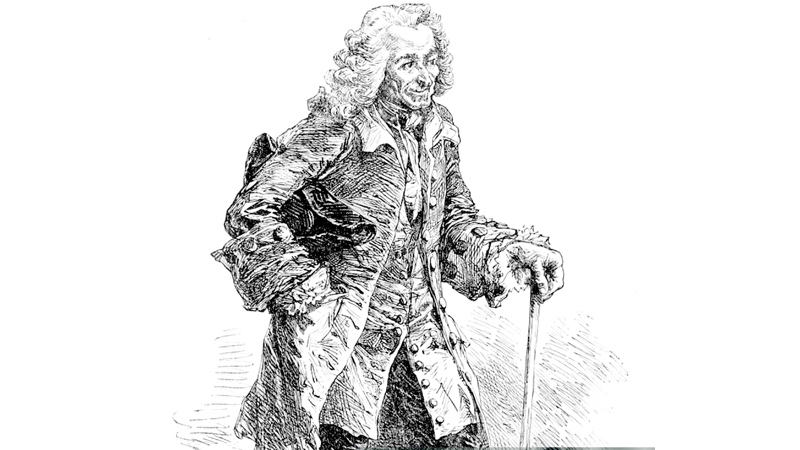 Most readers may not be aware of the fact that Voltaire was the pseudonym of the celebrated French writer and thinker Francois Marie Arouet. He was born into a middle-class family in Paris. He was the youngest of three children. Although he was trained to be a lawyer, he had a passion for writing.
Most readers may not be aware of the fact that Voltaire was the pseudonym of the celebrated French writer and thinker Francois Marie Arouet. He was born into a middle-class family in Paris. He was the youngest of three children. Although he was trained to be a lawyer, he had a passion for writing.
At the beginning of the 18th century he was a great literary figure. Some of his writings sparked controversies. When he started insulting the nobility, he was exiled from France. While living in England he was influenced by English philosophers and scientists. After some time, however, he returned to France as a wealthy man.
Voltaire lived in the Age of Enlightenment. Intellectuals were questioning everything in the world. They turned away from ideas propagated by the church and sought answers from philosophers and scientists.
Voltaire, in particular, challenged the concept of certainty. He said apart from mathematics and logic, almost all facts and theories had been revised at some point in history. He agreed with John Locke who had said there were no innate ideas which we believed to be true. The ideas changed from country to country. Voltaire encouraged people not to accept what the rulers or the church had said but to think for themselves.
Voltaire, the 18th century genius, proved the validity of the old adage that the pen is mightier than the sword. When he returned to France from England, he was given a rousing welcome. In the 21st century, he is remembered as the man who dragged Europe out of the morass of medieval ideas and institutions.
For more than 60 years he fought against injustice, bigotry, privilege and religious fanaticism. What is more, his revolutionary ideas paved the way for the French Revolution that took place 11 years after his death. However, Voltaire never preached violence. He only fought for reforms and change from the rule by a monarch. He firmly believed that liberty consisted of dependence on nothing but the law.
Stinging ridicule
Voltaire had a way with words. He was a prolific writer who soon became the most widely read author at the time. Unlike his contemporaries, he presented his philosophical ideas with stinging ridicule. He has left us a legacy of 20,000 delightful letters and numerous other writings including ‘Candide.’ He said common sense was not so common. Although he was against the church, he had faith in God. He said, “If God did not exist, He would have to be invented.”
It is interesting to know how Francois Marie Arouet came to be known as Voltaire. Scholars believe that the name came from his school nickname Monsieur Volontaire (Mr Willful). When his prosperous father insisted that he should become a barrister, Voltaire told him, “I will make a position for myself that costs nothing.”
He lived at a time when Louis XIV was ruling France. Like many despots, the king did not favour free speech and did not tax the nobility. Voltaire was determined to change the situation. When he wrote ‘Oedipus’, a play that dealt a scathing attack on tyranny, he had to get the approval from the royal censor to stage it. Luckily for him, the royal assent was given to the play with the support extended by Philippe the Duke of Orleons who moved freely with writers and poets.
Thereafter, he started writing pamphlets attacking the regime’s acts of injustice. When Voltaire exposed the private life of the Duke, he was imprisoned for 11 months. On his release, however, he attended the premiere of his play ‘Oedipus’ which was a huge success. Thus at the age of 24 Voltaire became a celebrity.
Witty remarks
At the height of his fame, Voltaire moved in French high society like a colossus. People flocked around him to listen to his witty remarks. Although he was a small-made man, Voltaire’s charms beguiled many French girls. Soon he developed a passion for Adrienne Lecouvreur, a promising actress. As in most love affairs, he had a rival. The Chevalier de Rohan too was interested in the actress.
One day Rohan barged into the theatre box where Voltaire and Adrienne were sitting.
Rohan mockingly said, “Monsieur Arouet? Monsieur Voltaire? What really is your name?” Voltaire retorted, “I am the first of my line as you are the last of yours.”
A few days later Rohan got his men to attack Voltaire, but he escaped with a few bruises. Then he challenged Rohan for a duel. It was a norm at the time that a nobleman could not fight with a commoner. However, if a nobleman refused to fight with a commoner, people would call him a coward. Rohan resolved the problem by sending Voltaire to the Bastille by using his influence.
Even in prison, Voltaire did not remain silent. First, he wrote an account of the problem he had faced. Then he offered to go to England if he was set free. Ultimately, Voltaire was released from prison and he moved to England once again.
Ode to his mistress
While living in England, Voltaire became the first French writer to speak English fluently. He was also the first to translate William Shakespeare’s plays into French. When he wrote a long narrative ‘Henriade,’ it was hailed as an epic by literary critics. The book earned him $2100, a huge sum at the time. At the same time, King Louis XV permitted Voltaire to return to France. When he returned to France, his beloved Adrienne was seriously ill. She died in his arms. Grief-stricken Voltaire was outraged when her body was taken to a common burial ground. Then he penned an ode to his dishonoured mistress.
Voltaire goes down in history as a man who was engrossed in the struggle against ecclesiastical tyranny.
He said, “Politics is not in my line; I have always confined myself to doing my little best to make men less foolish and more honourable.”
He was tired of monarchs and their countries. He wrote, “They are unable to govern their wives or their households, but they take great pleasure in regulating the universe.” His panacea for social ills was the spread of property ownership that gave personality and an uplifting pride. He favoured the formation of a republic, but he knew its flaws.
When Voltaire died, he was refused a Christian burial in Paris, but some of his friends took his body out of the city and buried it in a holy ground. In 1791, the National Assembly of the Triumphant Revolution forced Louis XV to recall Voltaire’s remains to the Pantheon. Finally his ashes were escorted through Paris in a procession of 100,000 men and women, while 600,000 flanked the streets. On his tombstone, only three words appear: “Here lies Voltaire.”






